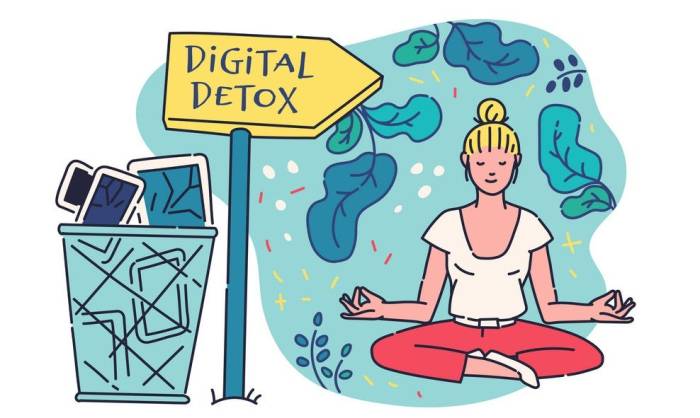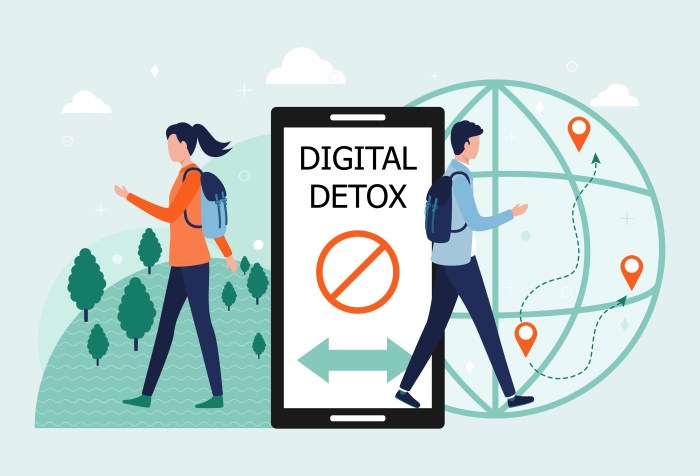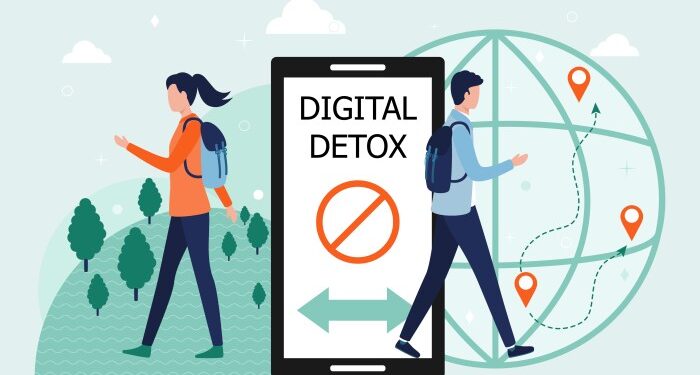In today's digital age, a constant barrage of screens and notifications can take a toll on our well-being. This compelling topic explores the reasons behind the necessity of a digital detox and how it can positively impact our lives.
Introduction to Digital Detox
Digital detox refers to taking a break from digital devices such as smartphones, computers, and tablets to reduce stress, increase mindfulness, and improve overall well-being.
It is essential to disconnect from the constant distractions of technology to focus on real-world interactions, hobbies, and self-care activities. Excessive screen time has been linked to various mental health issues such as anxiety, depression, and poor sleep quality.
The Impact of Screen Time on Mental Health
- On average, adults spend over 11 hours a day interacting with digital media, leading to decreased attention span and productivity.
- Excessive use of social media has been associated with feelings of loneliness, low self-esteem, and a fear of missing out (FOMO).
- Constant exposure to screens emitting blue light can disrupt the body's natural sleep-wake cycle, leading to sleep disturbances and insomnia.
- Children and adolescents who spend more than 2 hours a day on screens are at a higher risk of developing behavioral problems and attention disorders.
Signs You Need a Digital Detox
In today's digital age, it's easy to become overwhelmed by constant connectivity and screen time. Here are some common signs that indicate you may need a digital detox:
Decreased Productivity
Excessive screen time can lead to decreased productivity as it can be a major distraction. Constantly checking notifications, scrolling through social media feeds, and engaging in online activities can take away valuable time from tasks that require focus and attention.
Increased Stress and Anxiety
Spending too much time on digital devices can contribute to increased stress and anxiety. The constant influx of information and the pressure to stay connected can overwhelm the mind and negatively impact mental health.
Difficulty Disconnecting
If you find it challenging to disconnect from your devices even during leisure time or when spending time with loved ones, it could be a sign of digital overload. The inability to set boundaries with technology can lead to a lack of presence and engagement in real-life interactions.
Impact on Relationships
Digital addiction can have a significant impact on relationships, both personal and professional. Spending excessive time on screens can lead to neglecting face-to-face interactions, causing misunderstandings, communication breakdowns, and feelings of isolation.
Benefits of a Digital Detox

Taking a break from digital devices can have numerous benefits on both physical and mental well-being. Here are some key advantages of undergoing a digital detox:
Improved Mental Well-being
- Reduced stress and anxiety levels
- Better quality of sleep
- Enhanced focus and concentration
- Increased mindfulness and presence in the moment
Success Stories of Individuals
After a digital detox, many individuals have reported feeling more relaxed, productive, and connected to their surroundings. They have experienced a sense of liberation from the constant distractions of digital devices and have found a renewed sense of purpose and clarity in their daily lives.
Tips for a Successful Digital Detox
When embarking on a digital detox, it's essential to have a plan in place to ensure a successful experience. Here are some practical tips to help you disconnect from digital devices, reduce screen time gradually, and replace digital activities with offline pursuits.
Set Clear Boundaries
- Establish specific times of the day when you will be completely unplugged from your devices.
- Designate tech-free zones in your home, such as the bedroom or dining area.
- Communicate your digital detox goals to friends and family to gain their support and understanding.
Limit Screen Time
- Use apps or tools that track your screen time and set limits on app usage.
- Gradually decrease the amount of time spent on social media, gaming, or browsing the internet each day.
- Replace screen time with activities like reading a book, going for a walk, or engaging in a hobby.
Find Offline Activities
- Explore new hobbies or revisit old passions that don't involve digital devices.
- Plan outdoor activities like hiking, biking, or picnics to enjoy nature and fresh air.
- Schedule social gatherings with friends or family for face-to-face interactions and quality time together.
Impact of Technology on Mental Health
Technology has become an integral part of our daily lives, offering convenience and efficiency. However, excessive use of technology, particularly screen time, can have a significant impact on mental health. From social media to video games, the constant exposure to digital devices has been linked to various mental health issues.
Excessive Screen Time and Mental Health
Research has shown that spending too much time in front of screens can lead to increased feelings of anxiety, depression, and loneliness. The blue light emitted by screens can disrupt our circadian rhythm, affecting our sleep patterns and overall mental well-being.
Social Media and Mental Health
Social media platforms have been known to exacerbate feelings of anxiety and depression, as users compare their lives to curated and often unrealistic portrayals on social media. Constant scrolling and seeking validation through likes and comments can negatively impact self-esteem and mental health.
Impact of Technology on Sleep Quality
Studies have found a strong correlation between screen time before bed and poor sleep quality. The stimulation from screens can interfere with the production of melatonin, the hormone responsible for regulating sleep. This can lead to difficulty falling asleep, staying asleep, and ultimately affect our overall mental health.
Setting Boundaries with Technology
Setting boundaries with technology is crucial in maintaining a healthy relationship with our digital devices. By establishing limits on screen time and usage, we can prevent technology from taking over our lives and impacting our overall well-being.
Strategies for Creating a Healthy Relationship with Technology
- Designate tech-free zones in your home, such as the dining area or bedroom, to promote offline interactions and relaxation.
- Set specific time blocks for checking emails, social media, and other digital activities to avoid constant distractions throughout the day.
- Use apps or tools to track your screen time and set reminders for breaks to prevent excessive use of devices.
- Practice mindfulness and be present in the moment by limiting multitasking and focusing on one task at a time.
Examples of How Setting Limits on Screen Time Can Improve Overall Well-being
- Increased productivity: By reducing screen time, you can allocate more time to important tasks and activities, leading to improved focus and efficiency.
- Better sleep quality: Limiting device usage before bedtime can help regulate your sleep patterns and promote a restful night's sleep.
- Enhanced mental health: Setting boundaries with technology can reduce feelings of anxiety and stress, allowing for more time for self-care and relaxation.
- Stronger relationships: By prioritizing face-to-face interactions over digital communication, you can strengthen your connections with others and foster meaningful relationships.
End of Discussion

As we conclude our discussion on digital detox, it's clear that taking a break from our digital devices is not just a luxury but a vital need for our mental health and overall well-being. Embracing this practice can lead to a more balanced and fulfilling life in this fast-paced digital world.
FAQ Corner
Can digital detox really improve mental well-being?
Yes, disconnecting from digital devices can reduce stress, improve focus, and enhance overall mental health.
How can I gradually reduce my screen time?
Start by setting small goals, like turning off notifications or designating tech-free periods during the day.
What are some offline activities I can do during a digital detox?
Engage in hobbies like reading, hiking, painting, or spending quality time with loved ones without screens.






